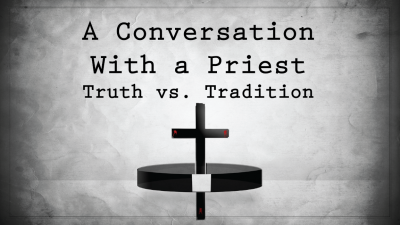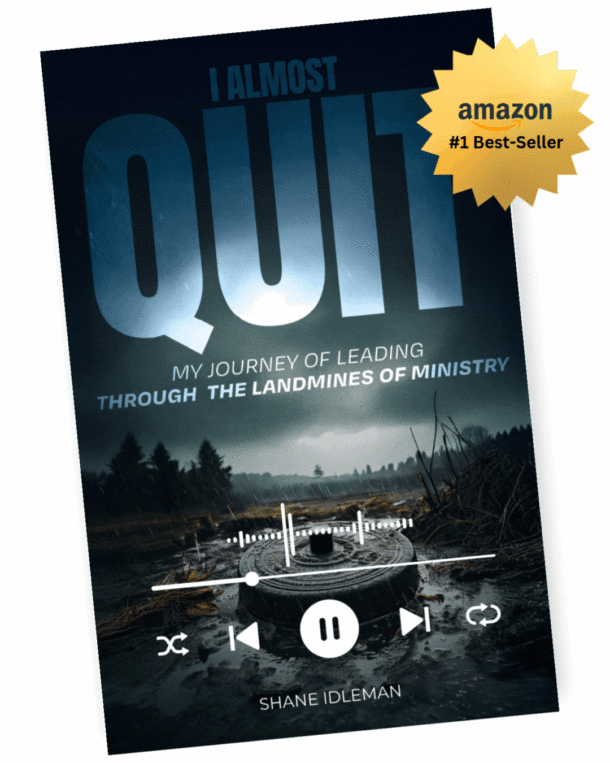
A Conversation With a Priest – Truth vs. Tradition
-Shane Idleman
I have Catholic friends who are devoted to God – they are pillars in our community. I attended a Catholic High School and loved the faculty. I desire peace with all men, but the Bible also encourages me to boldly and confidently present a scriptural basis for truth.
1. There cannot be two absolute authorities. In the same way that we cannot believe both the Bible and the Book of Mormon, we cannot believe the Bible and many traditions that are not grounded in Scripture but actually contradict it. Jesus said that we can make the word of God of no effect by our traditions (cf. Mark 7:13).
The church is the “pillar and support of the truth” (1 Tim. 3:15) – it comes under the truth, it’s not equal to it. We believe in apostolic succession in that we believe what the first Apostles believed. The word Protestant comes from the word “protest”. Protestants want the Church to return to the authority of Scripture alone.
2. Adoration of Mary. When the government and the church united toward the end of the 4th century, the departure from biblical truth increased. Mary was eventually hailed as co-redeemer and mediator; her perpetual virginity and immaculate conception are still upheld.
Granted, not all Catholics view Mary as a co-redeemer, but the study of Mariology suggests otherwise. Antipater of Bostra, a father of the Council of Ephesus, wrote this about Mary, “Hail, you who acceptably intercede as Mediatrix for mankind”.
The Catholic doctrines of “Perpetual Virginity” and “Immaculate Conception,” teach that Mary maintained her virginity and was conceived without sin. But the Bible teaches that all have sinned and fallen short of the glory of God (cf. Romans 3:23). This teaching elevates Mary.
Historical Christianity teaches that Mary was highly favored, but she does not play a role in redemption, nor should we pray to her. We believe that Jesus is the only way, the only truth, and the only life. No one comes to the Father except through Him (cf. John 14:6).
3. The Papacy, Priests, Communion, and Christ. The Bible says that we do not need an additional mediator or priest because Jesus is our only mediator (cf. Hebrews 4:15). Salvation comes through Christ alone: “For by grace you have been saved through faith, and that not of yourselves; it is the gift of God” (Ephesians 2:8).
Scripture is the final authority, but Catholicism promotes submission to the teachings of the Pope, bishops, and traditions that often contradict Scripture. Followers are encouraged to lean on Papal interpretation for the answers. Confirming this, the priest that I interviewed said that decrees from the papacy are equal with Scripture.
As an altar boy, I believed that only the priest could administer communion as “alter Christus” (another Christ), but the Bible says that this can be done by any believer (cf. Mark 14:22-25). Peter taught the priesthood of all believers (cf. 1 Peter 2:5).
The purpose of communion is to examine our lives and remember Christ’s death. The Bible does not teach transubstantiation – the belief that the bread and wine used in communion physically change into the actual flesh and blood of Jesus as an ongoing sacrifice. The controversial text in John 6:50 about consuming Christ’s body and blood, refers to partaking and belonging to Him. Jesus said earlier in that discourse not to labor “for the food which perishes, but for the food which endures to everlasting life, which the Son of Man will give you” (6:27).
The priests in the Old Testament were encouraged to marry, but Catholicism encourages celibacy. 1 Timothy 4:1-3 says that in latter times some will depart from the faith by forbidding to marry, and commanding to abstain from certain foods.
God calls qualified men (elders) to lead the church in submission to Christ, not one central power (cf. 1 Timothy 3). One of the qualifications of a leader is to be the husband of one wife and to lead his home well.
4. Purged in purgatory. Many remain dependent on the Church to relieve suffering in purgatory. According to Catholicism, purgatory is a temporary place where the soul is purged (purified) in preparation for heaven. Although sins are forgiven periodically through confession and penance, the punishment still remains. But the Bible says that Christ is an all sufficient Savior – He paid the full price on the cross. Suggesting that we need purging after death contradicts Christ’s finished work on the cross (cf. Hebrews 10:14).
The priest I interviewed suggested that purgatory is the best way to deal with shame and guilt. But Acts 3:19 states otherwise, “Repent, and be converted so that times of refreshing will come from the presence of the Lord.” Peace is a byproduct of repentance – having Christ as Lord and Savior. No additional penalty or purging remains. He paid the full price.
5. Salvation by works. Through taking the sacraments, infant baptism, church membership, praying to Mary and the saints, confessing to a priest, and so on, does the Church promote salvation through works?
Catholicism teaches that good works help to maintain our righteousness before God. But the Bible says that we are justified because of Christ’s work on the cross. There is nothing additional to work for. We “work out” our salvation with fear and trembling, but we don’t “work for” it, nor do we maintain it.
When my mother was 12, and Catholic, she lost her father in a car accident. She recounts nightmares of struggling to pull her father from hell. Did he die in a state of sin without confession and penance? Was his fate sealed? The Bible says that if we confess our sins to God that He will forgive us and purify us (cf. 1 John 1:9).
Many speak of feeling tremendous guilt and anxiety for this very reason – did they “do” enough. The Bible is clear: As believers, we can stand before God because our sin debt is paid in full – no intercessor, mediator, penance, or work can add to Christ’s complete work. Repentance, obedience, and full surrender is what He asks.
True peace comes from a true relationship with Christ. Do you have peace? Do you truly know Him? “If you confess with your mouth the Lord Jesus and believe in your heart that God has raised Him from the dead, you will be saved” (Romans 10:9).
Protestant or Catholic, you don’t want to live your life with a question mark here.

